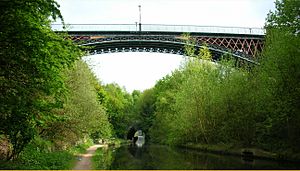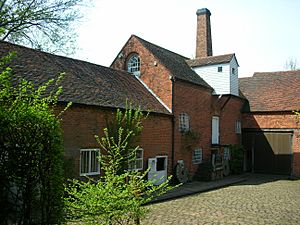Economic history of Birmingham facts for kids
Birmingham in England has a really interesting history of how it grew and became a big city. It started developing its economy way back in the Middle Ages, and it's been growing ever since!
Contents
How Birmingham Became a Metalworking Hub
Around 1538, a visitor named John Leland saw that Birmingham was full of skilled smiths. These smiths were like expert craftspeople who made things from metal. They created useful items such as knives and nails.
By 1683, Birmingham had over 200 workshops, mostly in areas like Digbeth and Deritend. They also started making guns and brass items. The metal itself usually came from nearby places like Staffordshire and other parts of the West Midlands.
Many people moved to Birmingham from the surrounding areas. This helped the metalworking industries grow even more. The city's population jumped from about 5,000 people in 1700 to nearly 24,000 by 1750. By 1775, it was around 40,000! This made Birmingham the third largest town in the UK, after London and Bristol. In 1791, a writer named Arthur Young even called Birmingham "the first manufacturing town in the world."
Birmingham's Canals: A Game Changer
Canals were like superhighways for boats carrying goods. The very first cargo was moved on the Birmingham Canal in 1770. This canal made a huge difference! It greatly lowered the cost of moving heavy goods like coal, which used to be carried by road.
The canal system in Birmingham kept growing throughout the late 1700s and early 1800s. This network of waterways helped Birmingham's industries connect with other parts of the country.
Water Power: An Early Energy Source
Long before steam engines, people used water to power machines. As early as 1755, a famous inventor named Matthew Boulton leased Sarehole Mill. Boulton was a key person in the Industrial Revolution and a member of the Lunar Society, a group of important thinkers.
It's believed that Boulton changed the mill's machinery to work with metal. Sarehole Mill was used for many things. It ground grain for food, crushed bones for fertilizer, rolled sheet metal, and even drew wire.
Steam Power Arrives in Birmingham
Birmingham had very efficient workshops and ways of making things. Because of this, the city was actually a bit slow to adopt the new methods of the Industrial Revolution. The steam engine was developed in Birmingham by Matthew Boulton and James Watt around 1770.
However, it took about sixty more years for steam engines to become common in the city. In 1815, there were only about forty steam engines in Birmingham, and many of them were quite small. Even so, steam power and better ways of making iron were very important for the nearby Black Country. By the end of the 1700s, the Black Country supplied most of the metal that Birmingham's factories needed.
Birmingham: A City of Inventors
Many clever inventors came from Birmingham throughout its history. The city had a skilled workforce and a good setup for businesses. This encouraged other inventors and business people from all over the world to come and set up their shops in Birmingham.
 | Selma Burke |
 | Pauline Powell Burns |
 | Frederick J. Brown |
 | Robert Blackburn |



